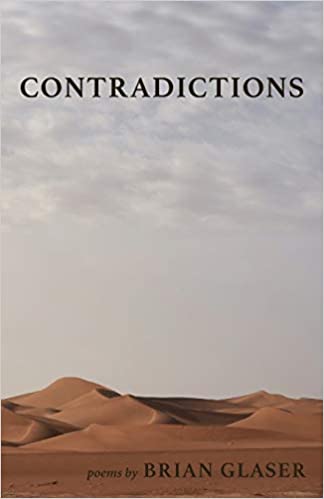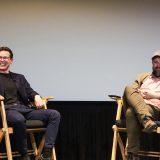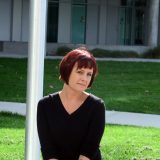Faculty Books: Glaser Takes You on a Winding Journey Through Poetry
February 1, 2021
 Associate Professor Brian Glaser (English Department, Wilkinson College) takes the reader on a winding journey through sentimental places, beloved family, tricky politics, and the elusive passing of time in his new book of poetry, Contradictions.
Associate Professor Brian Glaser (English Department, Wilkinson College) takes the reader on a winding journey through sentimental places, beloved family, tricky politics, and the elusive passing of time in his new book of poetry, Contradictions.
The Voice of Wilkinson sat down to chat with Dr. Glaser about his latest work.
Voice of Wilkinson: Why the title Contradictions?
Brian Glaser: There are a few reasons, and a couple of them are contradictory. The first is that presidents need to hear themselves contradicted. Global climate change is real.
Theodor Adorno and Walt Whitman had opposing views about contradictions. Adorno said our culture sends us contradictory messages all the time because of its capitalist structure, and a utopian community wouldn’t do that. Whitman said democracy thrives on contradictions, and each of us is a bundle of inextricable contradictions within ourselves. As I wrote Contradictions I was living with the way I keep both beliefs alive in myself at the same time.
There’s a literary theory joke there too, but it’s not especially funny.
VoW: You seem to draw influence from your family, nature, and a connection to places- how do these things define you and your work?
BG: Nature—it’s my temperament and the impressions left by my early experiences in a green part of Michigan. Places—I write with a few audiences especially in mind—the poetry therapy crowd, and our local community. Most of the world is told that real power lives somewhere else. And there’s definitely truth to that. But experiencing your local environment can be a source of power, too.
Family—I write about my family because they mean so much to me. I publish some of what I write about my family because there wasn’t a lot in my undergraduate education in English that said that fathering is worthy of poetic representation. So I kind of carry a grudge, and hope things can be different for my students’ generation.
VoW: My favorite poem was “OC Pride,” as a native it touched on my conflicting feelings about Orange County- what were your thoughts while writing it? What would an ideal Orange County look like to you in the future?
BG: I’m so glad you had a favorite poem! It’s so sane to have conflicting feelings about this place. I hope I got most of my thoughts while writing into the poem. That’s a great question about an ideal Orange County. We could start with a lot fewer people incarcerated.
VoW: What does spirituality mean to you and how does it take shape in “Contradictions”?
BG: Spirituality means different things to me at different times. The spirituality of Contradictions mainly comes from dwelling on questions that would still be facing us even if we solved all of the material dimensions of social justice.
VoW: Do you view writing as a kind of spiritual practice?
BG: Yes. One of the forms of poetry that was popular early in the modern period of English literary history is the meditation. Mostly my poems are meditations—that’s why they’re often sequences.
VoW: Do you have any advice for students who want to write poetry?
BG: Yes. Listen to yourself.
VoW: I see the theme of politics several times in your work, what from your work do you want to resonate with your reader, especially during this time of strife in the United States?
BG: I was really influenced by some American Studies scholars I worked closely with in Duesseldorf for a couple of years. I came to see that national identity in the US often works like a kind of unacknowledged religion. I hope my book contributes to the unending project of secularizing our collective sense of national identity. The US doesn’t deserve or make good use of religious reverence.
VoW: Do you have any hopes for 2021?
BG: I hope it’s a year of healing for those who lost loved ones in 2020. And if I really stretch my hopefulness, I hope it’s a year of discovery of a new normal, one where the global human community finds we have more in common than competition.

